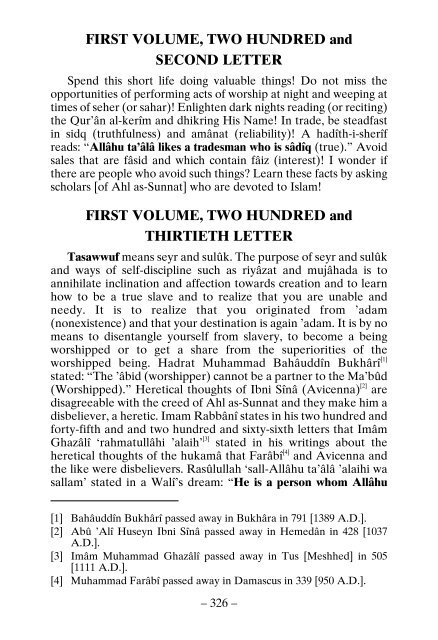O Son !
THE BOOK ‘O SON’ Al-hamdu lillâhi Rabbil ’âlamîn. Wa-s-salâtu wa-s-salâmu ’alâ Rasûlinâ Muhammadin wa Âlihi wa Sahbihi ajma’în. 1– O son! Collecting from books written by the scholars of the Hanafî Madhhab three hundred and sixty hadîth-i-sherîfs and forty-four khabars and also the seven essentials and the five rukns and the seven wâjibs and the fourteen sunnats and the twenty-five mustahabs and the fourteen mufsids of namâz, I have explained them for you. Adapt your acts and deeds to these teachings so that you attain fayz and nejât (salvation)! 2– Also for your information, I have collected a thousand and ninety âdâb (adabs) for you and for other young Muslims like you. If you adapt your actions and acts of worship to these teachings, they will be sufficient for you. If you laze, disobey Allâhu ta’âlâ and cease from these practices and manners, you will be afflicted with slavery and disgrace in the world and subjected to torment in the world to come. If you live up to them and advise your Muslim brothers to do the same, it will be useful for you. They will say blessings over you. And Haqq ta’âlâ will accept their invocations. For, a slave will be pardoned on account of another slave’s invocations for them.
THE BOOK ‘O SON’
Al-hamdu lillâhi Rabbil ’âlamîn. Wa-s-salâtu wa-s-salâmu ’alâ
Rasûlinâ Muhammadin wa Âlihi wa Sahbihi ajma’în.
1– O son! Collecting from books written by the scholars of the
Hanafî Madhhab three hundred and sixty hadîth-i-sherîfs and
forty-four khabars and also the seven essentials and the five rukns
and the seven wâjibs and the fourteen sunnats and the twenty-five
mustahabs and the fourteen mufsids of namâz, I have explained
them for you. Adapt your acts and deeds to these teachings so that
you attain fayz and nejât (salvation)!
2– Also for your information, I have collected a thousand and
ninety âdâb (adabs) for you and for other young Muslims like you.
If you adapt your actions and acts of worship to these teachings,
they will be sufficient for you. If you laze, disobey Allâhu ta’âlâ
and cease from these practices and manners, you will be afflicted
with slavery and disgrace in the world and subjected to torment in
the world to come.
If you live up to them and advise your Muslim brothers to do
the same, it will be useful for you. They will say blessings over you.
And Haqq ta’âlâ will accept their invocations. For, a slave will be
pardoned on account of another slave’s invocations for them.
Create successful ePaper yourself
Turn your PDF publications into a flip-book with our unique Google optimized e-Paper software.
FIRST VOLUME, TWO HUNDRED and<br />
SECOND LETTER<br />
Spend this short life doing valuable things! Do not miss the<br />
opportunities of performing acts of worship at night and weeping at<br />
times of seher (or sahar)! Enlighten dark nights reading (or reciting)<br />
the Qur’ân al-kerîm and dhikring His Name! In trade, be steadfast<br />
in sidq (truthfulness) and amânat (reliability)! A hadîth-i-sherîf<br />
reads: “Allâhu ta’âlâ likes a tradesman who is sâdîq (true).” Avoid<br />
sales that are fâsid and which contain fâiz (interest)! I wonder if<br />
there are people who avoid such things? Learn these facts by asking<br />
scholars [of Ahl as-Sunnat] who are devoted to Islam!<br />
FIRST VOLUME, TWO HUNDRED and<br />
THIRTIETH LETTER<br />
Tasawwuf means seyr and sulûk. The purpose of seyr and sulûk<br />
and ways of self-discipline such as riyâzat and mujâhada is to<br />
annihilate inclination and affection towards creation and to learn<br />
how to be a true slave and to realize that you are unable and<br />
needy. It is to realize that you originated from ’adam<br />
(nonexistence) and that your destination is again ’adam. It is by no<br />
means to disentangle yourself from slavery, to become a being<br />
worshipped or to get a share from the superiorities of the<br />
worshipped being. Hadrat Muhammad Bahâuddîn Bukhârî [1]<br />
stated: “The ’âbid (worshipper) cannot be a partner to the Ma’bûd<br />
(Worshipped).” Heretical thoughts of Ibni Sînâ (Avicenna) [2] are<br />
disagreeable with the creed of Ahl as-Sunnat and they make him a<br />
disbeliever, a heretic. Imam Rabbânî states in his two hundred and<br />
forty-fifth and and two hundred and sixty-sixth letters that Imâm<br />
Ghazâlî ‘rahmatullâhi ’alaih’ [3]<br />
stated in his writings about the<br />
heretical thoughts of the hukamâ that Farâbî [4] and Avicenna and<br />
the like were disbelievers. Rasûlullah ‘sall-Allâhu ta’âlâ ’alaihi wa<br />
sallam’ stated in a Walî’s dream: “He is a person whom Allâhu<br />
[1] Bahâuddîn Bukhârî passed away in Bukhâra in 791 [1389 A.D.].<br />
[2] Abû ’Alî Huseyn Ibni Sînâ passed away in Hemedân in 428 [1037<br />
A.D.].<br />
[3] Imâm Muhammad Ghazâlî passed away in Tus [Meshhed] in 505<br />
[1111 A.D.].<br />
[4] Muhammad Farâbî passed away in Damascus in 339 [950 A.D.].<br />
– 326 –

















